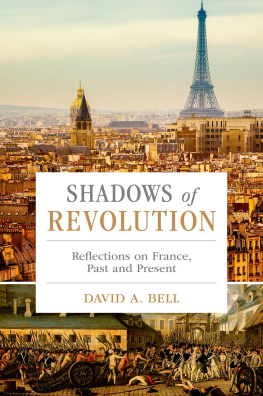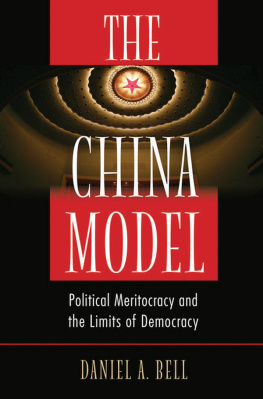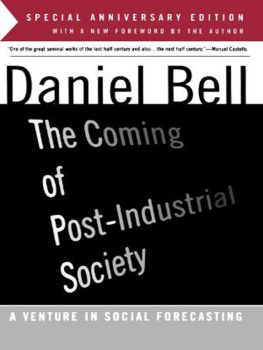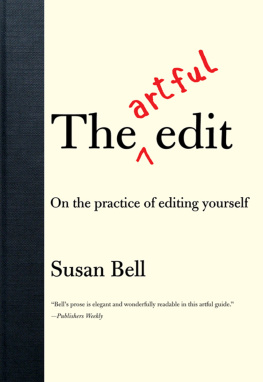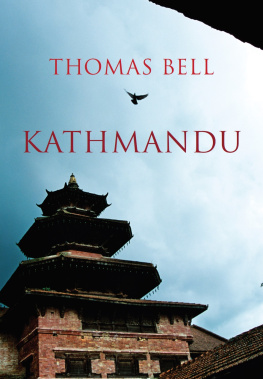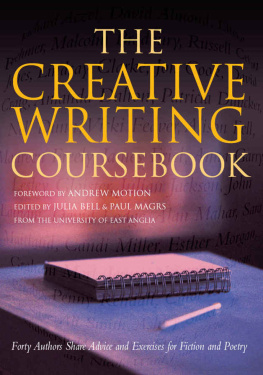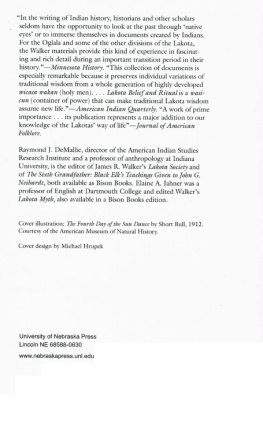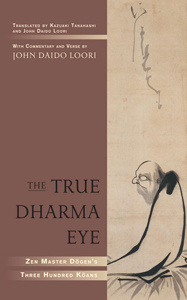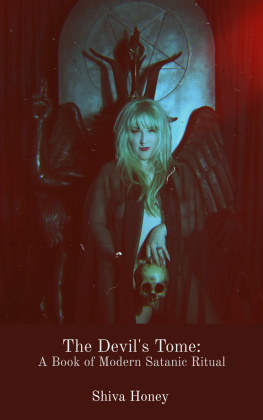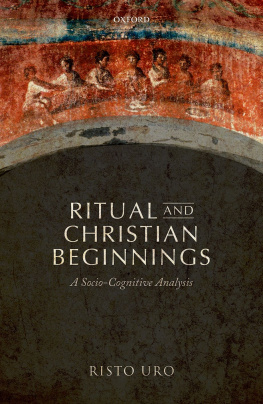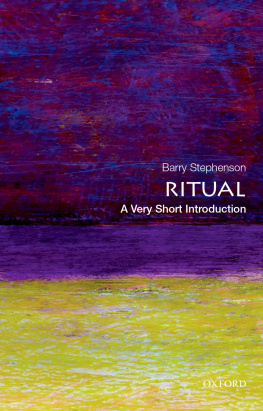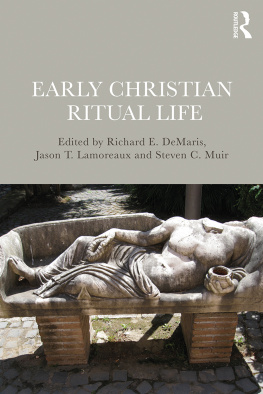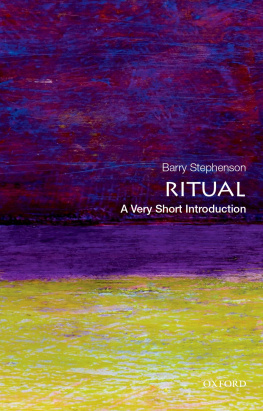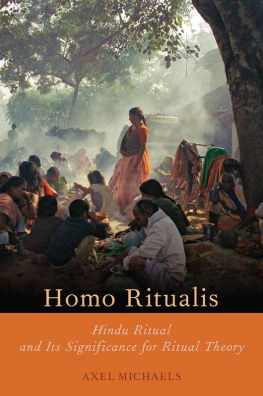Bell - Ritual Theory, Ritual Practice
Here you can read online Bell - Ritual Theory, Ritual Practice full text of the book (entire story) in english for free. Download pdf and epub, get meaning, cover and reviews about this ebook. City: USA;New York;Oxford, year: 2010;1992, publisher: Oxford University Press, genre: Politics. Description of the work, (preface) as well as reviews are available. Best literature library LitArk.com created for fans of good reading and offers a wide selection of genres:
Romance novel
Science fiction
Adventure
Detective
Science
History
Home and family
Prose
Art
Politics
Computer
Non-fiction
Religion
Business
Children
Humor
Choose a favorite category and find really read worthwhile books. Enjoy immersion in the world of imagination, feel the emotions of the characters or learn something new for yourself, make an fascinating discovery.

- Book:Ritual Theory, Ritual Practice
- Author:
- Publisher:Oxford University Press
- Genre:
- Year:2010;1992
- City:USA;New York;Oxford
- Rating:4 / 5
- Favourites:Add to favourites
- Your mark:
- 80
- 1
- 2
- 3
- 4
- 5
Ritual Theory, Ritual Practice: summary, description and annotation
We offer to read an annotation, description, summary or preface (depends on what the author of the book "Ritual Theory, Ritual Practice" wrote himself). If you haven't found the necessary information about the book — write in the comments, we will try to find it.
Ritual Theory, Ritual Practice — read online for free the complete book (whole text) full work
Below is the text of the book, divided by pages. System saving the place of the last page read, allows you to conveniently read the book "Ritual Theory, Ritual Practice" online for free, without having to search again every time where you left off. Put a bookmark, and you can go to the page where you finished reading at any time.
Font size:
Interval:
Bookmark:
RITUAL THEORY, RITUAL PRACTICE
Catherine Bell


Oxford University Press, Inc., publishes works that further
Oxford Universitys objective of excellence
in research, scholarship, and education.
Oxford New York
Auckland Cape Town Dar es Salaam Hong Kong Karachi
Kuala Lumpur Madrid Melbourne Mexico City Nairobi
New Delhi Shanghai Taipei Toronto
With offices in
Argentina Austria Brazil Chile Czech Republic France Greece
Guatemala Hungary Italy Japan Poland Portugal Singapore
South Korea Switzerland Thailand Turkey Ukraine Vietnam
Copyright 1992 by Catherine Bell
Foreword 2009 by Oxford University Press
Published by Oxford University Press, Inc.
198 Madison Avenue, New York, NY 10016-4314
www.oup.com
First issued as an Oxford University Press paperback, 2009
Oxford is a registered trademark of Oxford University Press
All rights reserved. No part of this publication may be reproduced,
stored in a retrieval system, or transmitted, in any form or by any means,
electronic, mechanical, photocopying, recording or otherwise,
without the prior permission of the publisher.
Library of Congress Cataloging-in-Publication Data
Bell, Catherine M., 1953
Ritual theory, ritual practice / Catherine Bell.
p. cm.
Includes bibliographical references and index.
ISBN 978-0-19-973362-0
1. Ritual. 2. AnthropologyMethodology. I. Title.
BL600.B46 1992
291.38dc20 9116816 CIP
17 19 18
Printed in the United States of America on acid-free paper
Ritual is pure activity, without meaning or goal. F. STAAL
This [interpretation] has allowed the scholarly fantasy that ritual is an affair of the tremendum rather than a quite ordinary mode of human social labor. J.Z. SMITH
Ritual [is] like a favoured instance of a game. C. LEVI-STRAUSS
In ritual, the world as lived and the world as imagined turn out to be the same world. C. GEERTZ
[There is] the widest possible disagreement as to how the word ritual should be understood. E. LEACH
The more intractable puzzles in comparative religion arise because human experience has been wrongly divided. M. DOUGLAS
Ritual Theory, Ritual Practice, reissued here more than 17 years after its initial publication, changed the framework for understanding the nature and function of ritual. Catherine M. Bells profound insight was that ritual, long understood as thoughtless action stripped of context, is more interestingly understood as strategy: a culturally strategic way of acting in the world. Ritual is a form of social activity. This argument is meticulously established and beautifully presented in the chapters that follow. Unfolding like a commanding lecture, Ritual Theory, Ritual Practice remains Catherines greatest contribution to the study of religion.
This book, in many ways, constitutes one part of what Anthony Giddens would call the front and back regions of any scholarly life. Ritual Theory, Ritual Practice presents the theories and observations that Catherine placed front and center for all to see. Explicit in her life but also embedded in this book, however, are other lessons. They linger in the back region, so to speak, for someone to notice and point out.
These lessons are strikingly visible to me because, for thirty years Catherine Bell was a friend, a mentor, and an inspiration to me. I met her first at the University of Chicago in the late 70s when we were graduate students at the Divinity School. I was studying Freud, Rorschach, and religion; she was studying Chinese morality books. Hearing her present her research in Joseph Kitagawas seminar, was an aha experience for me: So thats how to do a seminar presentation! I found myself taking notes on how she organized her material and presented her thesis. In 1985 Catherine joined the Religious Studies department at Santa Clara University where I had been teaching for a year, and that graduate school aha experience deepened into a close friendship. During our years as colleagues, I found myself continuing to take notes on Catherines way of thinking, working, and living her practices until her death in 2008.
Catherine had a remarkable ability to think beyond the frame of both current discourse and past practice. While many scholars recount the debates that have shaped their field and make a small contribution to move the discourse forward, she transformed the way that scholars in our field think and write. She sketched out contemporary debates, traced historical lineages, and then took stunning conceptual leaps, rearranging pieces in entirely new, and thoroughly enlightening, ways. Theres a fearlessness to her work. She speaks the truth, unconstrained by concerns about critical reactions an important lesson for those whose schooling in tact and diplomacy can place limits on creative vision.
Ritual Theory, Ritual Practice illustrates well her fearless intellectual style and her sense of freedom from past constructions. The book received the award for the Best First Book in the History of Religions in 1994, and has redirected the thinking of the discipline. One cannot write on ritual today without citing her work. Her ability to perceive the current topography and see beyond the horizon inspires me still.
Catherines practice of asking big questions and seeking large patterns is clearly visible in her work; it was evident in her course development and pedagogy as well. She structured every course around a compelling intellectual question that would both capture the interest of her students and tackle an unresolved problem in the discipline. Her students all undergraduates participated in creating scholarly trajectories, sorting through data, discerning patterns, and struggling to find answers. Whether teaching methodology in Ways of Studying Religion, area studies in Asian Religions, or advanced courses like Magic, Science and Religion, Time and the Millennium, or Religion and Violence, she challenged and inspired her students to ask real questions, to understand the significance of those questions for the contemporary world, and to perceive the larger patterns emerging from texts and practices.
Always attentive to the patterns in how students learn, it was Catherine who first brought me a copy of Benjamin Blooms taxonomy of cognitive development: she had designed a series of assignments to guide students toward increasingly sophisticated thinking, challenging them to move from comparison to interpretation, and then to analysis and evaluation. She suggested that in the classroom nothing stands alone every text must be carefully paired with another so that students can tease out contradictions and develop new syntheses. And she created guidelines on how to read a book when youre not reading it for pleasure. Her instructions started with self awareness and self inquiry: What are your questions? Next, she instructed, one must ask about the author as Other: What is the authors intent? Finally, she directed her students to integrate self understanding and close reading of the text by engaging in critical reflection and creative response. Her guidelines worked: her students were truly touched by the books they read with her. They produced remarkable work in her courses, and they carried newly developed critical and creative abilities into other courses, into graduate programs, and into life beyond the academy.
Next pageFont size:
Interval:
Bookmark:
Similar books «Ritual Theory, Ritual Practice»
Look at similar books to Ritual Theory, Ritual Practice. We have selected literature similar in name and meaning in the hope of providing readers with more options to find new, interesting, not yet read works.
Discussion, reviews of the book Ritual Theory, Ritual Practice and just readers' own opinions. Leave your comments, write what you think about the work, its meaning or the main characters. Specify what exactly you liked and what you didn't like, and why you think so.

